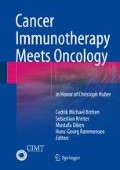Abstract
Monoclonal antibodies (mAbs) for cancer therapy have achieved considerable success in recent years and now provide important tools for managing a range of cancers, most notably in the case of haematological malignancies. This success builds on a long history of scientific and clinical investigation that aimed to understand the complexities of target selection, antibody engineering and immune regulation of tumour growth. Here we give an overview of the ups and downs of the history of mAb drugs and their current status. Particular focus will be given to the latest immune-stimulating mAbs, such as ipilimumab and nivolimumab, which have shown promise in difficult-to-treat solid tumours, including metastatic melanoma and lung cancer, and whose mechanism of action is not to attack the tumour cells directly, but to boost existing anticancer immunity to levels that can deal with advanced disease. An attractive feature of this therapeutic strategy is the durable objective responses which are being seen in responding patients. The future for these and many other mAb-based drugs is very encouraging but will depend on the deep understanding of cancer biology, including its stroma and molecular regulation, on innovative approaches to target and antibody selection and on clever clinical trials that will guide appropriate development strategies, leading towards more specific and less toxic therapies for human cancer.
Access this chapter
Tax calculation will be finalised at checkout
Purchases are for personal use only
References
Beatty GL, Torigian DA, Chiorean EG, Saboury B, Brothers A, Alavi A, Troxel AB, Sun W, Teitelbaum UR, Vonderheide RH, O’Dwyer P (2013) A phase I study of an agonist CD40 monoclonal antibody (CP-870,893) in combination with gemcitabine in patients with advanced pancreatic ductal adenocarcinoma. Clin Cancer Res 19(22):6286–95
Chen SH, Pham-Nguyen KB, Martinet O, Huang Y, Yang W, Thung SN, Chen L, Mittler R, Woo SL (2000) Rejection of disseminated metastases of colon carcinoma by synergism of IL-12 gene therapy and 4-1BB costimulation. Mol Ther 2(1):39–46
Göttlinger H, Johnson J, Riethmüller G (1986) Biochemical and epitope analysis of the 17-1A membrane antigen. Hybridoma 5(Suppl 1):S29–S37
Hale G, Xia MQ, Tighe HP, Dyer MJ, Waldmann H (1990) The CAMPATH-1 antigen (CDw52). Tissue Antigens 35(3):118–127
Köhler G, Milstein C (1975) Continuous cultures of fused cells secreting antibody of predefined specificity. Nature 256(5517):495–497
Lee CS, Cragg M, Glennie M, Johnson P (2013) Novel antibodies targeting immune regulatory checkpoints for cancer therapy. Br J Clin Pharmacol 76(2):233–247
Li F, Ravetch JV (2013) Antitumor activities of agonistic anti-TNFR antibodies require differential FcγRIIB coengagement in vivo. Proc Natl Acad Sci U S A 110(48):19501–19506
Niwa R, Hatanaka S, Shoji-Hosaka E, Sakurada M, Kobayashi Y, Uehara A, Yokoi H, Nakamura K, Shitara K (2004) Enhancement of the antibody-dependent cellular cytotoxicity of low-fucose IgG1 is independent of FcgammaRIIIa functional polymorphism. Clin Cancer Res 10(18 Pt 1):6248–6255
Savola S, Klami A, Myllykangas S, Manara C, Scotlandi K, Picci P, Knuutila S, Vakkila J (2011) High Expression of Complement component 5 (C5) at Tumor Site Associates with Superior Survival in Ewing’s Sarcoma Family of Tumour Patients. ISRN Oncol 2011:168712
Scott AM, Wolchok JD, Old LJ (2012) Antibody therapy of cancer. Nat Rev Cancer 12(4):278–287
Sliwkowski MX, Mellman I (2013) Antibody therapeutics in cancer. Science 341(6151):1192–1198
White AL, Chan HT, French RRC, Beers SA, Cragg MS, Johnson PWM, Glennie MJ (2013) FcγRΙΙB controls the potency of agonistic anti-TNFR mAbs. Cancer Immunol Immunother 62(5):941–948
Author information
Authors and Affiliations
Corresponding author
Editor information
Editors and Affiliations
Rights and permissions
Copyright information
© 2014 Springer International Publishing Switzerland
About this chapter
Cite this chapter
Glennie, M., Türeci, Ö., Johnson, P.W.M. (2014). Antibody Therapy in Oncology. In: Britten, C., Kreiter, S., Diken, M., Rammensee, HG. (eds) Cancer Immunotherapy Meets Oncology. Springer, Cham. https://doi.org/10.1007/978-3-319-05104-8_10
Download citation
DOI: https://doi.org/10.1007/978-3-319-05104-8_10
Published:
Publisher Name: Springer, Cham
Print ISBN: 978-3-319-05103-1
Online ISBN: 978-3-319-05104-8
eBook Packages: MedicineMedicine (R0)

